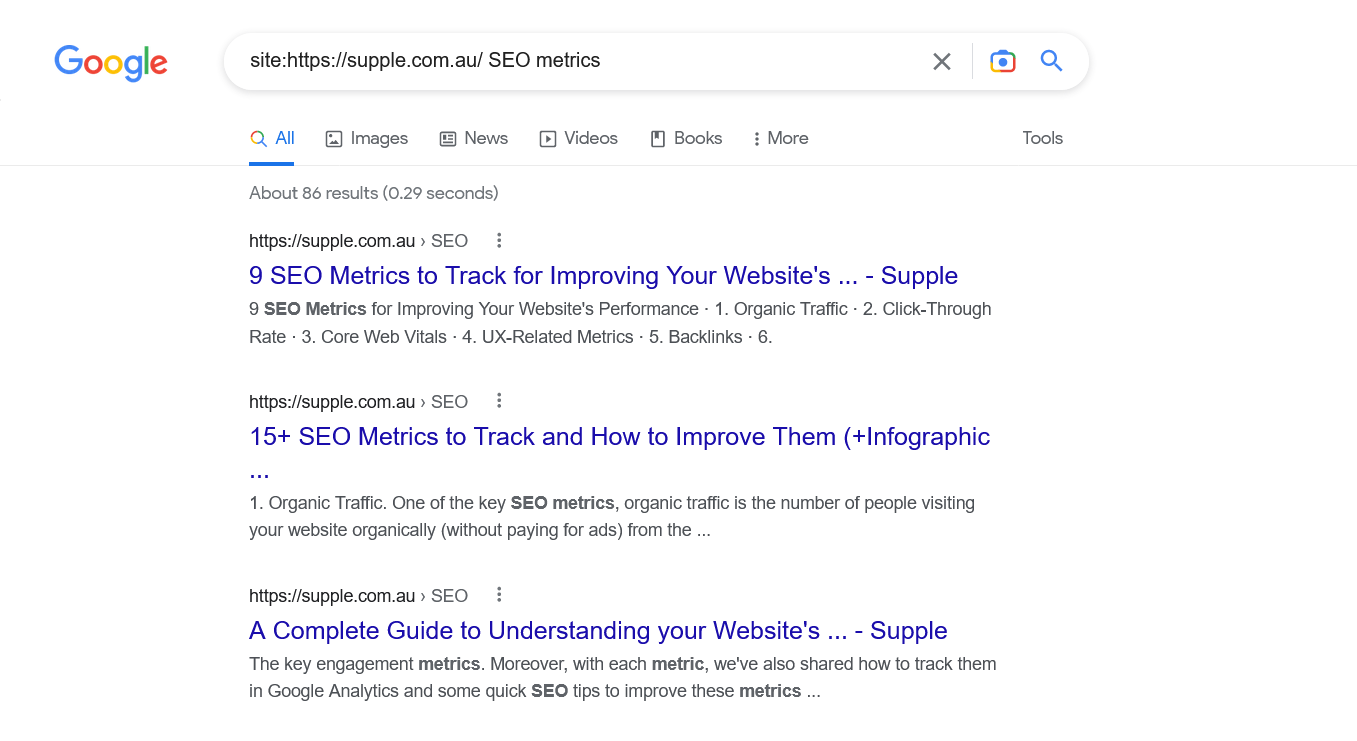What is Keyword Cannibalization & 5 Proven Ways to Avoid it
Many SEO professionals think that targeting the same keyword on multiple pages will increase their chances of ranking on the first page of search results.
But they could not be more wrong.
Think about this — if you’re searching for “best travel bags” and see two webpages from the same website, you’ll definitely get confused about which webpage to click on.
The same thing applies to blog posts. If you have a fairly consistent blog schedule, there is a good chance that the topics of some of your blog posts will overlap at some point in future.
Even if you’ve been extra careful with keyword research, your blog posts are likely to end up using the same keywords sooner or later.
When that happens, it will result in traffic drops, losing top rankings in SERPs, and more.
To prevent this, you need to learn about keyword cannibalisation and how to avoid it on your website.
What is Keyword Cannibalisation?
Keyword cannibalisation in SEO refers to a situation where multiple webpages or blog posts on the same website target the same keyword for the same search intent (knowingly or otherwise) and compete against one another on Google search results.
For example, let’s say that you have two blog posts targeting the same keyword — Best SEO Audit Tool.
Now, if both blog posts target the searchers for the same type of queries, and none of the pages are able to obtain optimum ranking and traffic for this keyword, then that’s a keyword cannibalisation issue.
Why is Keyword Cannibalisation Bad for SEO?
Keyword Cannibalisation is bad because it can hurt your overall SEO performance.
Here are the top three consequences of optimising multiple pages for the same keyword:
- Search Engine Bots Get Confused
Many amateur SEO professionals believe in a misconception that if they optimise multiple pages for the same keyword, it will increase their chances of securing top position in SERPs.
The reason why this can be bad for SEO is that you’ll be competing with yourself instead of your competitors.
Plus, search engine bots also get confused when several of your webpages target the same keyword. When they face such a situation, they prioritise ranking a page that’s well-optimised, whether it’s the page you want to rank for or not.
- Crawl Budget Gets Wasted
Crawl budget refers to how many webpages or URLs search engine bots can and want to crawl on your site in a given timeframe. Each site is assigned a limited crawl budget by the search engines.
Plus, if you have multiple pages targeting the same keyword, it wastes your crawl budget. For new or small websites, this may not be an issue. But for large websites, such as eCommerce stores or news sites, it can become a serious problem.
This is because when search engine crawlers find duplicate content on your website, they reduce your crawl budget on the next visit. This, in turn, can prevent your important pages from getting indexed.
- It Weakens your Backlink Value
If you’re familiar with SEO, you might already know how important backlinks are. They can help to boost your rankings in the SERPs. However, if your website has a keyword cannibalisation issue, it can decrease the value of your backlinks.
For instance, let’s imagine that you have two pages targeting the same keyword. You’ve acquired three backlinks for each page from authoritative & relevant sources.
Unfortunately, their combined value won’t amount to much if your competitor has one page targeting the same keyword with six backlinks from equally authoritative sources.
Now, if the search engine has to choose between your two pages with three backlinks each and your competitor’s page with six backlinks, it is likely to prioritise your competitor.
In other words, your competitor will rank higher than your two pages even if you have the same total number of backlinks combined.
This is why it’s critical to learn how to avoid keyword cannibalisation. And that’s what we’re going to talk about next!
How to Avoid Keyword Cannibalisation — 5 Proven Methods
Now that you know what is keyword cannibalisation and why it’s bad for SEO, let’s look at the different ways you can avoid it.
Create a Solid Keyword Strategy
If you’re familiar with SEO, you already know how important keyword strategy is.
And by honing your target keyword strategy perfectly, you can easily avoid keyword cannibalisation on your website.
In other words, it is about optimising your webpages and blog posts to target different keywords & search phrases.
For example, instead of having five blog posts competing for the “Local SEO” keyword, you can optimise each page for a similar but more specific keyword such as Plumber SEO, Dentist SEO, or Real-Estate SEO.
This way, you can still stay on the same topic (Local SEO) but can target a more specific audience.
Track your Keyword Rankings & Performance
If you truly want to avoid keyword cannibalisation at all costs, having a solid keyword strategy won’t be enough.
Once you’ve selected the keywords to target, you’ll also need to track their rankings & overall performance.
Tracking the performance of your target keywords will help to find out which keywords are ranking, which are facing stiff competition, and which have been caught up in cannibalisation.
The good news is, tracking your target keyword rankings & performance is quite easy. There are plenty of tools you can utilise such as Google Analytics 4, SEMrush, Ahrefs, etc.
And once you start keeping track of your keywords’ performance, you can tweak your strategy to fix keyword cannibalisation when it arises.
Focus on Topics
Many times keyword cannibalisation happens because your SEO team focuses more on keywords rather than topics.
If you prioritise keywords, there is a good chance that you’ll neglect high-value topics and overall content quality. This can result in keyword cannibalisation & gradually slow down your performance in Google search results.
To prevent this, you should pay equal attention to writing on relevant topics, instead of spending all your efforts on keyword research.
There are plenty of tools you can use to find relevant topics to write on your website. Some of the most popular tools for finding topic ideas include Quora, Answer The Public, Social Media Platforms, and so on.
Using these tools, you should figure out what topics your target audience is most interested in and direct your marketing efforts towards creating quality content for those topics.
This will help you prevent keyword cannibalisation, attract more visitors, and establish a strong authority in your industry.
Perform Content Gap Analysis
Performing a content gap analysis can help to see if your previously published content is still relevant to your target audience’s interests and marketing goals.
By performing content gap analysis regularly, you can evaluate your current content marketing strategy, find keyword cannibalisation, organise your published content neatly, and determine if your strategy needs more clarity.
If you’re planning to perform a content gap analysis on your website, make sure to answer the following questions:
- Are your topics still relevant to your target readers?
- Is the information you’ve published still relevant or outdated?
- Are the statistics mentioned in your content getting outdated?
- Are you using the target keywords right?
- Which topics have fulfilled your marketing goals?
Answering these questions will help you come up with new topic ideas and do a content expansion on the existing ones.
Publish Long-Form Content
Many topics seem too complex to cover in a single blog post. So most SEO teams break them into several blog posts without realising that it could easily lead to keyword cannibalisation.
For example, let’s say that your target keyword is “Make Money Blogging”.
For this particular keyword, you can write many different blog posts on this target keyword such as —
- How to Make Money Blogging
- Tips to Make Money Blogging
- Different Ways to Make Money Blogging
As you can see, all of these blog posts have overlapping concepts.
So publishing these blog posts will end up competing against each other for the same target keyword, resulting in keyword cannibalisation.
The best way to avoid this is by publishing a comprehensive blog post addressing all subtopics (i.e. tips, best ways, etc.) instead of publishing a separate blog post for each.
From the SEO standpoint, this is much more beneficial as it will allow you to target multiple and long-tail keywords in a single blog post.
That said, if you plan to publish such long-form content on your website, make sure to add a clickable table of contents at the beginning so that readers can easily jump to the sections they’re most interested in.
How to Find & Fix Keyword Cannibalisation on your Website?
If you suspect that your website is a victim of keyword cannibalisation, there are plenty of ways to identify this issue.
How to Find Keyword Cannibalisation (Options)
Let’s look at the different methods to find keyword cannibalisation on your website.
Conduct an Internal Search
The most straightforward to find keyword cannibalisation on your website is by conducting an internal search.
Put another way, try looking up different search queries in your website search bar.
For example, if your company offers SEO services in Melbourne, Brisbane, & Sydney, and you frequently publish content on SEO topics for each city separately, conduct an internal website search with keywords that you have used often.
This could be SEO strategies for Plumbers in Melbourne or SEO tips for Small Businesses in Melbourne.
Performing an internal website search will pull up all webpages & blog posts for this search query. And once you have the list, check if two or more posts are competing for the same keyword.
Run a Site: Search on Google
If you want an easier way to find keyword cannibalisation, run a “site:https://yourwebsitedomain.com” search on Google.
Here’s what it looks like in the Google Search:
As you can see, the Google site search instantly discovered that we’ve multiple blog posts targeting the “SEO Metrics” keyword.
However, each of these pages targets a different search intent and has a different content format. So they’re not competing for the same user queries.
Similarly, you can also try performing a Google site search using different keywords and search queries to find keyword cannibalisation on your website.
Third-Party Tools
If you don’t want to perform a manual search to find keyword cannibalisation, there are numerous third-party SEO tools you can use for identifying keyword cannibalisation on your website.
SEOScout’s Keyword Cannibalisation Checker, for example, is convenient to use and can instantly create a report of keyword cannibalisation instances on your website.
Alternatively, you can also use SEMrush Position Tracking Tool. it offers a bird’s eye view into your website’s overall rankings, including data that highlights keyword cannibalisation issues on your website.
If you don’t like paid tools such as SEOScout or SEMrush, you can consider using Ahrefs’ free keyword rank checker tool. It offers similar search engine ranking insights about your website, including keyword cannibalisation issues as well.
How to Fix Keyword Cannibalisation (Solutions)
Here are the solutions you can use to fix keyword cannibalisation on your website.
Delete, Redirect, or Merge Posts
If some of your competing blog posts have low-quality & outdated content and are not performing well on Google SERPs, it’s best to delete them to make room for better-performing blog posts.
Although, if these low-value blog posts have valuable backlinks, it’s best to redirect them to your best blog post competing for the same keyword using 301 redirects.
Alternatively, if two or more posts are competing against each other and both have valuable content and are performing well on Google SERPs, you can also consider merging them.
For example, if two of your blog posts are “How to Start a Blog” & “How to Make Money Blogging”, you can combine both into one blog post “How to Start a Blog and Make Money From It”.
Update Content & Target Keywords
If you’d like to keep all blog posts targeting the same keywords, you can consider updating their content & altering their primary target keywords to fix the keyword cannibalisation issue.
This process is often called de-optimisation. In this process, you need to review your content and assess the primary target keywords you’ve used. The best way to do this is by creating a Google Sheet to track all keywords.
For example, if you have three blog posts targeting the same keyword (i.e. WordPress Website Development) but covering different aspects of the said topic such as
- WordPress website development: Beginner’s Guide
- WordPress website development for small businesses
- WordPress website development for startups
In this case, the latter two posts need to be de-optimised to fix keyword cannibalisation issues on your website.
Modify Internal & Inbound Links
The last solution to fix keyword cannibalisation issue is to modify the internal & external links on your website.
As you may already know, internal links are critical to send signals to Google about which pages on your website are important.
In simple words, the more internal links a post has, the higher it is in the hierarchy on your website.
The same applies to inbound links (backlinks) as well. For the uninitiated, external link building helps to boost website authority and prove to search engines that you’re trustworthy.
However, when you delete a post with backlinks, you lose the link juice coming from those backlinks. In this situation, deleting your post is not recommended. Instead, you should figure out a way to retain the link juice by redirecting the old post to the new one.
If that’s not possible, you can always reach out to the publisher of the website that has linked to your page and ask them to replace the link by pointing it to the new post on your website.
This process is quite time-consuming but it’s definitely worth the effort for fixing keyword cannibalisation & retaining the link juice.
Ending Note
And there you have it! This is how you can prevent keyword cannibalisation on your website. And if you already have keyword cannibalisation issues on your website, these solutions will help to fix them.
That said, if you need professional assistance to fix keyword cannibalisation on your website, feel free to reach out to us at any time.
DIGITAL MARKETING FOR ALL OF AUSTRALIA
- SEO AgencyMelbourne
- SEO AgencySydney
- SEO AgencyBrisbane
- SEO AgencyAdelaide
- SEO AgencyPerth
- SEO AgencyCanberra
- SEO AgencyHobart
- SEO AgencyDarwin
- SEO AgencyGold Coast
- We work with all businesses across Australia



